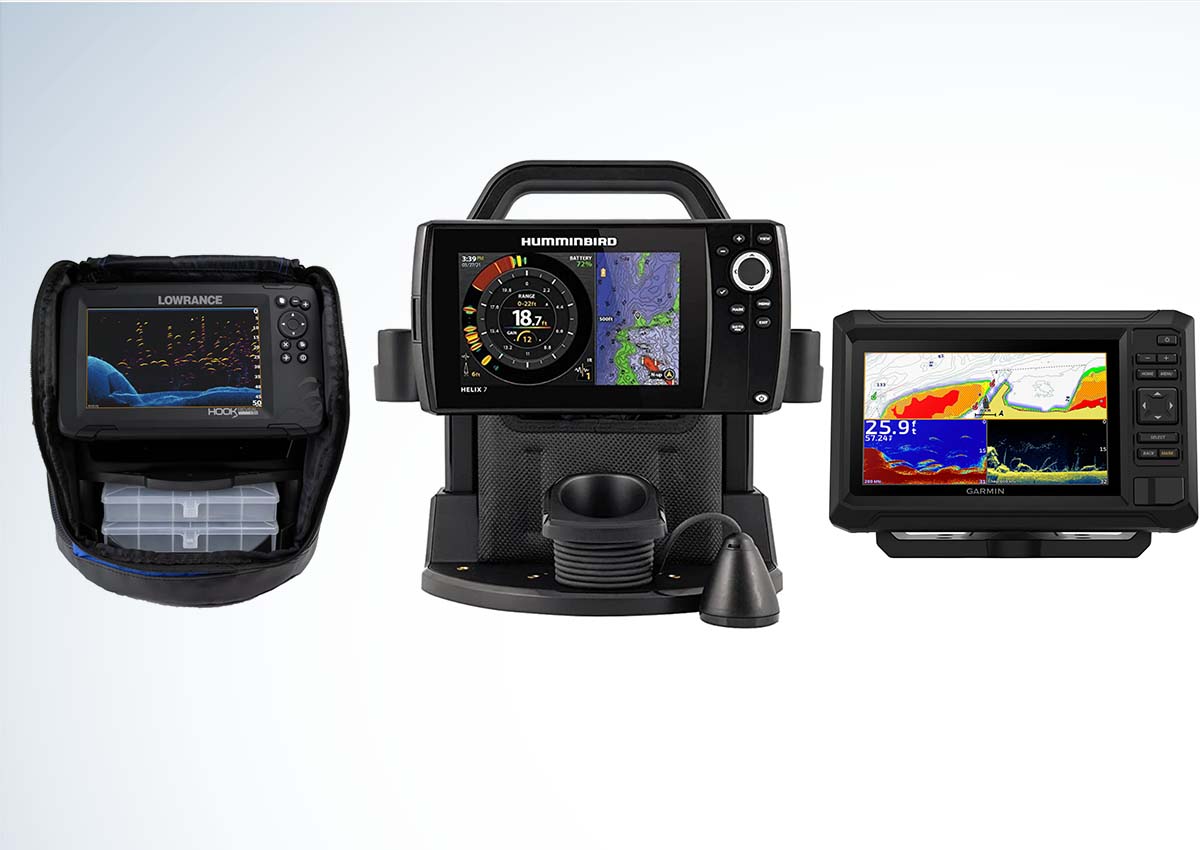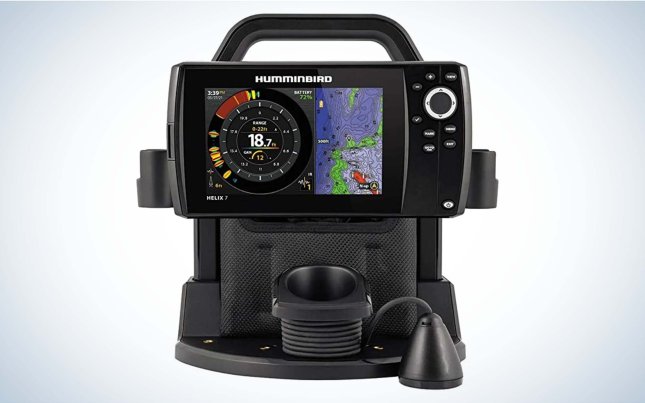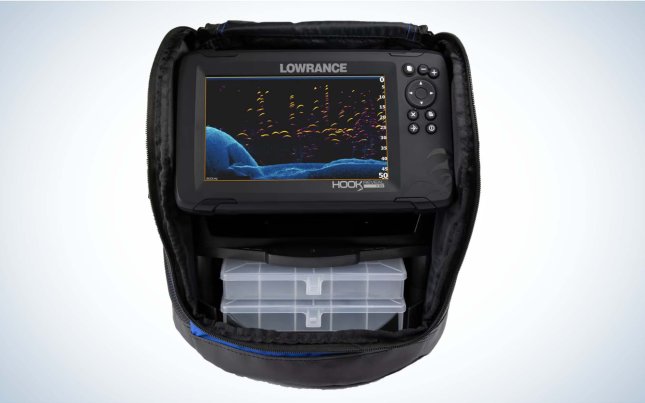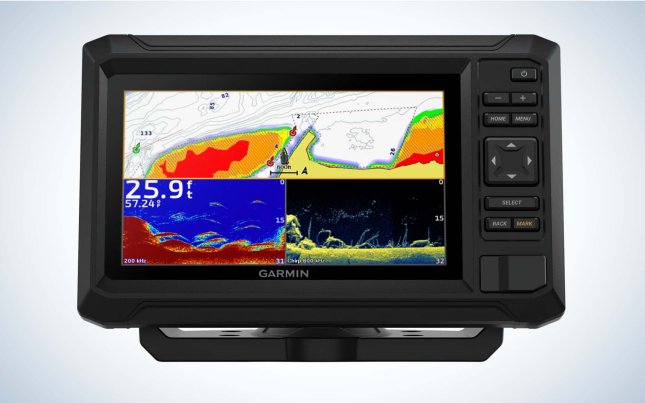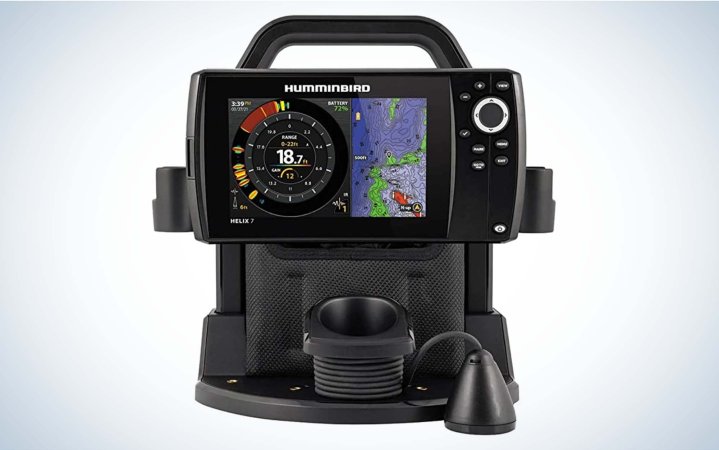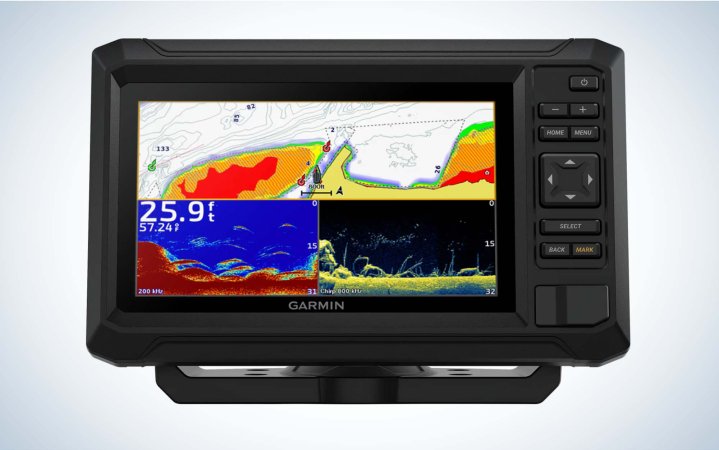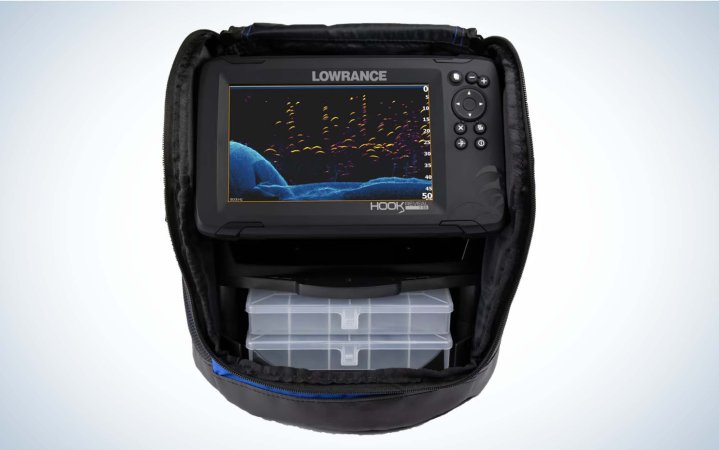We may earn revenue from the products available on this page and participate in affiliate programs. Learn More ›
Growing up in a bait shop in northern Minnesota in the 1980s, I was always up on the latest in baits, rods, reels, and electronics. So I witnessed and participated in the technological progression of portable fish finders over the past four decades.
Today’s portable all-in-one fish finders harken back to the first flasher I ran in my 14-foot Lund as a kid, the Lowrance “Little Green Box.” It opened from the top to reveal the red-flashing, fish-finding strobe below, all with a handle on the top for easy transport with a bracket-mounting pole transducer.
Of course, all we had back then was 2D sonar in flasher mode, not water temperature read-out, and certainly no digital display of the bottom, structure, and fish. Now units come with numerous features besides a flasher mode, like 2D sonar, down viewing, side viewing, accurate GPS lake mapping, and much, much more. Some portable fish finder units are also compatible with new side-scan and forward-facing sonar transducers.
For those not wanting to permanently install fishing electronics on their boat—or looking for a unit to use in a boat and on the ice—these new portable fish finders just can’t be beaten for ease of use and versatility. They’re also great for anglers fishing from kayaks, canoes, and smaller boats.
Here are my picks for the best portable fish finders.
- Best Overall: Humminbird Ice Helix 7 CHIRP GPS G4 All Season
- Best Budget: Garmin ECHOMAP UHD2 73CV and Portable Fishing Kit
- Best Mapping: Lowrance HOOK 7 Reveal 7 Splitshot
Best Portable Fish Finders: Reviews & Recommendations
Best Overall: Humminbird Ice Helix 7 CHIRP GPS G4 All Season
Pros
- Easy-to-use menu system
- Will read fish and structure to 400 feet
- Long battery life
- High-resolution
- Versatile
Cons
- Price
- Only 1-year limited warranty
- Does not come with LakeMaster or Navionics card (must be purchased separately)
Key Features
- 7-inch Display
- Two rod holders
- Dual Spectrum CHIRP Sonar
- Interference Rejection
- Adjustable Sonar Zoom
- GPS
- Humminbird Basemap with over 10,000 lakes
- Autochart LIVE user-mapping
- Includes Lithium battery
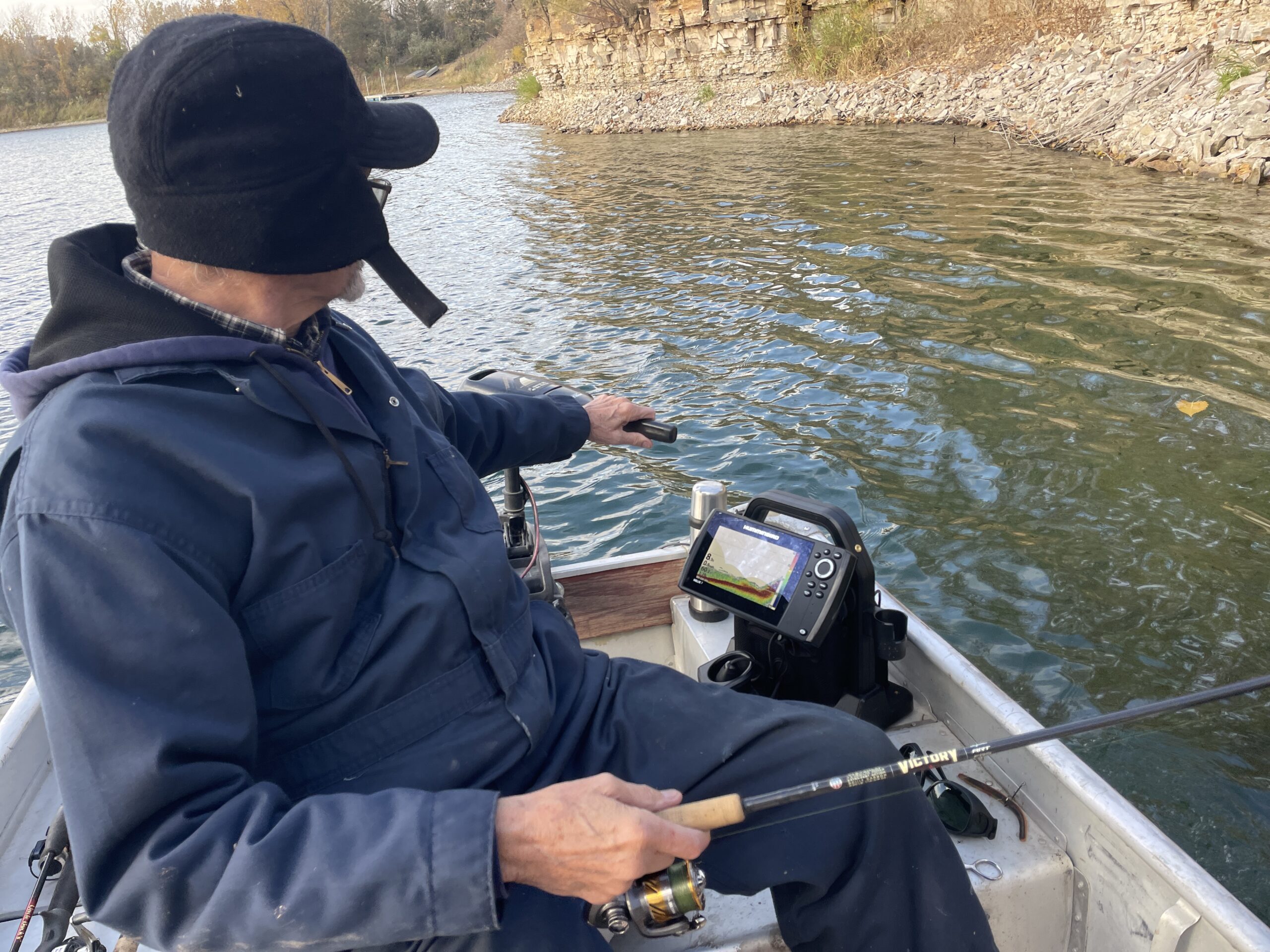
Humminbird is renowned for its clear 2D Sonar, ultra-precise Side Imaging, LakeMaster mapping, and more. From coast-to-coast—and even along the coast—both freshwater and saltwater anglers have turned to Humminbird for their sophisticated fish-finding capabilities. Built for use throughout the calendar year, from open water through ice season, the Humminbird Ice Helix 7 CHIRP GPS G4 All Season pack offers anglers everything but the kitchen sink.
For starters, it features crystal-clear Dual Spectrum CHIRP Sonar with ¾-inch target separation so you can clearly see fish and structure. The unit also features CHIRP Interference Rejection, which has six settings to keep competing sonar signals from cluttering the screen when you’re in a fish house full of anglers. The Adjustable Sonar Zoom hones in on fish, whether tight to the bottom or suspended high in the water column. This feature provides 2x zoom on the flasher screen and up to 16x zoom on the 2D sonar view.
The unit features a built-in GPS with Humminbird Basemap (more than 10,000 water bodies) and is compatible with both LakeMaster and Navionics maps. Additional features designed specifically for the ice angler include AutoChart Live ICE while allowing anglers to create real-time 1-foot contour maps.
The Humminbird pack also includes everything you need to use it on one of the best jon boats, canoe, kayak, or in other portable applications during the open-water season, including a transom mount CHIRP transducer, suction cup transducer mount, fish finder gimbal mount, and power cord. All fish-finding information is featured on a full-color, 7-inch HD LCD display with tons of adjustable brightness for day and night use.
Also, know that the Humminbird Ice Helix 7 CHIRP GPS G4 All Season pack is compatible with MEGA Side Imaging and MEGA Live with the purchase of separate transducer systems.
Testing
My father-in-law and I tested the Humminbird Ice Helix 7 CHIRP GPS G4 All Season pack from a 14-foot aluminum boat powered by a Minn Kota Endura transom-mount trolling motor, exactly the kind of setup many purchasers of a portable fish finder will be outfitting.
We fished an abandoned rock quarry in central Iowa that is populated with largemouth bass, sunfish, crappies, and pike and where we had never used electronics before. Although both of us had intuited depths and structures in the quarry over 20 years of fishing it—the Humminbird unit supplanted many of our guesses as to where drop-offs, ledges, breaks, and flats were located.
For example, the Humminbird’s crisp CHIRP 2D Sonar revealed a break in the southwest end of the quarry where the depth plummeted from 12- to 30 feet a good distance away from shore. We had never fished this area prior to what the Humminbird revealed. Did we catch fish? Yes, half-a-dozen good-sized largemouth bass, all on football-head jig and plastic combos worked down the break. Good find.
Speaking to the unit itself, it’s relatively quick to start up, and its menu system is easy to understand. While the quarry wasn’t featured in the built-in base maps, we were able to utilize its 2D Sonar and Down Imaging to great success to learn more about the quarry’s depths and fish-holding spots.
Best Budget: Garmin ECHOMAP UHD2 73CV & Portable Fishing Kit
Pros
- Intuitive menu system
- Built-in single-channel CHIRP Sonar—50/77/83/200 kHz; L, M, H CHIRP
- Built-in ClearVu Sonar—260/800/1000/1200 kHz
- Lightweight system
- Two-year warranty
Cons
- Does not come with LakeMaster or Navionics card (must be purchased separately)
- Must purchase separate transducer for ClearVu side-viewing
Key Features
- 7-inch display
- Weight: 1.5 pounds
- Garmin CHIRP 2D Sonar
- ClearVu Scanning Sonar
- Wi-Fi connectivity
- LakeVu g3 lake mapping and BlueChart maps with Navionics data

Garmin is making waves with its fish finders and recent forward-facing sonar development, first with Panoptix and now with LiveScope. Garmin doesn’t sell a portable fish finder package that meets my needs. They have the small Striker 4 and the Echomap Ice Fishing Bundle, but nothing that gave me the versatility to use on a boat or the ice. So I put together my own bundle combining the ECHOMAP UHD 73CV and Portable Fishing Kit, and I ended up with one of the best portable fish finders for the money. It should be noted that you can also buy the portable ice fishing kit separately.
Should you outfit your boat with more than one ECHOMAP UHD2, both 5- and 7-inch models can wirelessly share information such as sonar, waypoints and routes. Speaking of Wi-Fi, the ECHOMAP UHD2 also features built-in Wi-Fi connectivity to pair with the free all-in-one mobile app for access to the OneChart feature, software updates, Garmin Quickdraw Community data, and more.
Testing
The first thing I noticed upon turning on the Garmin ECHOMAP UHD 73CV is just how clear and crisp the ClearVu sonar display is, featuring high-contrast vivid scanning sonar palettes that make it easier than ever to distinguish fish and structure. The unit also features pre-loaded LakeVu g3 inland maps, BlueChart g3 coastal charts, and a worldwide basemap that supports Garmin Navionics+ and Garmin Navionics Vision+ marine cartography. So the maps for where I tested it—the Mississippi River—were pretty good.
The other thing about the Garmin unit is its menu and screen system is very intuitive to use with well-defined menu and back buttons to keep you from getting lost amidst its numerous features. Of all the units tested, it’s by far the easiest to use.
Did it help me locate fish during testing? Absolutely. And I caught a variety of species with its help.
Read Next: Best Ice Fishing Fish Finders
Best Mapping: Lowrance HOOK7 Reveal 7 Splitshot
Pros
- Autotuning sonar
- Bright display
- Weighs under one pound
Cons
- Not compatible with LakeMaster mapping
- Not compatible with Lowrance ActiveTarget forward-facing sonar technology
Key Features
- 7-inch display
- Genesis Live Real-Time Mapping
- Double the sonar coverage of other fish finders
- SplitShot transducer with High CHIRP and DownScan Imaging
- Contour+ US/Canada mapping card included
- Optimized keypad with one-touch access to key features
- Mapping options include C-MAP, C-MAP Genesis, Navionics

Over the past four decades, Lowrance has made numerous advances in fish-finding technology and become known for its top-notch, easy-to-read 2D Sonar. The recently-introduced Hook Reveal 7 Splitshot delivers great performance with fish-finding tools, including Autotuning Sonar, DownScan Imaging, and FishReveal, which makes fish easier to see by combining the benefits of Lowrance CHIRP sonar and DownScan Imaging on one screen. Whether you’re fishing a local spot or unfamiliar water, the Hook Reveal 7 Splitshot helps anglers find the best fishing areas with preloaded US inland mapping—and also gives the angler the option of mapping uncharted water—in real-time—with Genesis Live.
Testing
The Lowrance Hook Reveal 7 Splitshot portable pack took about a half hour to put together, but when it came time to mount the graph bracket the four black screws provided were too short and I had to make a trip to the hardware store. Other than that, everything went smoothly. I also kept looking through the instructions for a carry handle section to install as I put the base together. Apparently there isn’t one. The only carry handle is on the blue cloth case that comes with the unit. Both the Humminbird and Garmin portable units feature a handle built into the base that holds the graph in place, something Lowrance could use one in future generations of portable sonar products.
The Hook Reveal7 boots up very quickly after you press “on”. I chose my language as English and then you’re able to choose from a variety of screens. Then, I chose the chart screen to start my testing. I was impressed with CMAP+ Genesis for its coverage of the Mississippi River I was set to fish. It’s pretty close to LakeMaster. When I tried to switch to Sonar mode the screen read “Sonar Locked” and I had to open up YouTube on my phone to find a video instructing me out of the error.
Then it was easy to figure out. The buttons and cursors are a bit difficult to figure out, as far as getting back to the main menu, so it’s not quite as intuitive as the Garmin or Humminbird units. The 2D Sonar is what you’d expect from Lowrance—excellent. And it has a feature where you can DownScan with 2D Sonar which reveals even more sub-surface detail.
How to Choose a Portable Fish Finder

When it comes to computers, it’s always been a PC versus Mac world. In fish finders, some anglers gravitate to Lowrance, while others prefer Humminbird. Now, with Garmin on the scene, there’s a third option, and with the introduction of forward-looking Panoptix sonar a few years ago—and the improved LiveScope—Garmin is taking some market share from both Lowrance and Humminbird. But each excels in its own space. It’s simply a matter of matching the unit to how you fish and what you are looking for in a portable fish finder.
Why You Need Electronics
No matter what type of fishing you do—and from what kind of watercraft—knowing the water depth, precise GPS positioning to show where you are on a map, as well as obstacles and suggested travel routes (as well as buoys and wing dams on river systems and shallow reefs and bars in lakes and reservoirs), boat speed, etc., are all critical to safe travel and successful angling. Today’s GPS mapping also allows you to highlight depths—for example, marking any waters under 3 feet in red for “danger” areas where the props and skegs can be damaged, as well as depth contours that are high-probability fish-holding locations. Water temperature read-out also gives anglers additional information to determine fish location consistent with changes in weather and seasonality.
Standard 2D Sonar gives anglers a look at what’s directly under and around the portable transducer at a variety of different user-chosen angles—typically narrow (great for watching your jig in vertical fishing applications), medium, and wide cone coverage.
Down-viewing is much like 2D Sonar but can show more detail in both bottom composition and the presence of fish.
Flasher mode is the original format for viewing your bait, bottom, and fish in ice fishing applications, although most of these units also feature 2D Sonar with zoom for greater detail than flasher mode allows. A lot of ice anglers like to run both flasher and 2D Sonar in split-screen view for watching their bait—and fish response—in real-time.
Features to Look For in a Fish Finder
When shopping for a portable fish finder, you want to take numerous features into consideration. First, make sure the unit has GPS mapping and comes preset with lake/river/reservoir maps for your region. Many units accept detailed map “chips” that contain bottom contours in 1-foot increments, like LakeMaster and some of the newer Navionics and C-MAP products. You also want the ability to map while you’re boating and fishing; this feature takes constant sonar readings and re-adjusts for water level and any errors there might have been in the mapping preset in your portable fish finder unit.
Next, you want to make sure your unit has advanced 2D Sonar, with variable frequencies to adjust the cone angle to show narrower or wider bottom and fish coverage.
The unit should also possess some sort of Down-Viewing technology which can be used with 2D Sonar or without to provide an even more detailed picture of what’s going on below the boat.
Also, make sure that your unit has Side-Viewing capabilities with the use of a separately-purchased transducer in case you want to expand your fishing coverage to look up to 100 feet or more on each side of the boat. This technology reveals bottom structure and fish, allowing the angler to make waypoints for moving the boat and fishing closer or distancing the boat to make precise casts.
Likewise, check to see if the unit is compatible with Front-Facing Sonar technology, which also requires the purchase of a separate transducer, and often, a “black box”. This leap in fish finder technology allows anglers to follow their bait and fish in real-time over 100 feet from the boat—and is especially helpful in choosing the right presentation, adapting retrieve/cadence, and watching fish response.
Lastly, if you plan to use the portable unit on the ice, make sure it comes with an ice transducer and has both 2D graph and “flasher” modes—besides GPS mapping.

Final Thoughts
Whether you’re outfitting a small boat, kayak, canoe—or looking for a unit to carry on fishing trips utilizing a rental boat—and also want use on the ice during the winter, my best portable fish finders picks all offer great feature sets. Each has its merits, whether its sonar, mapping, or down- and side-viewing capabilities.
And the whole fish-finding paradigm is quickly changing to offer anglers information ahead of the boat (à la front-facing sonar), so you’ll want to make sure your chosen unit is compatible with additional front-facing sonar transducer systems, should you want to make the technological leap.
- Best Overall: Humminbird Ice Helix 7 CHIRP GPS G4 All Season
- Best Budget: Garmin ECHOMAP UHD2 73CV and Portable Fishing Kit
- Best Mapping: Lowrance HOOK 7 Reveal 7 Splitshot
